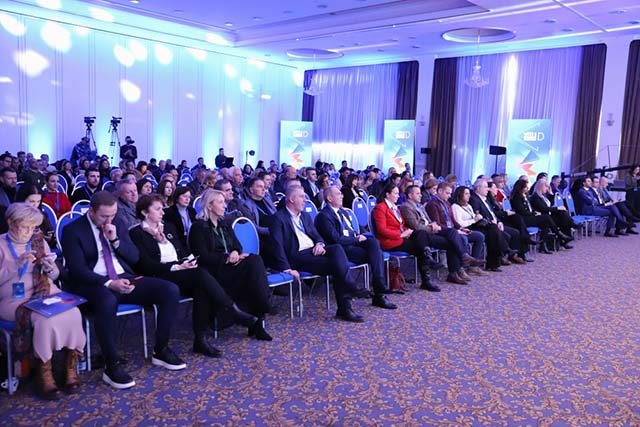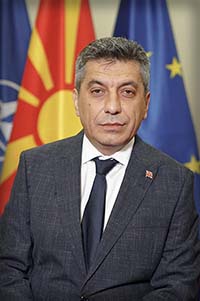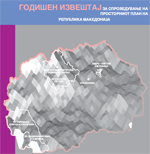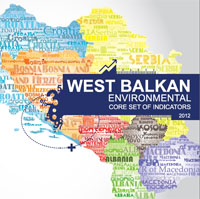(Skopje 23.01.2024) Today, within the framework of the annual conference “Year of European Opportunities”, at the second panel discussion “Investments in energy transition and infrastructure for a healthy environment and European future” discussed the Minister of Economy Kreshnik Bekteshi, the Minister of Environment and Physical Planning, Kaja Shukova, Viktor Andonov, Director od Development and Investments in ESM and Slavjanka Pejcinovska Andonova, environmental consultant.
 During his speech, Minister Bekteshi referred to the Investment Platform for a Just Energy Transition of North Macedonia, which was presented at the end of last year.
During his speech, Minister Bekteshi referred to the Investment Platform for a Just Energy Transition of North Macedonia, which was presented at the end of last year.
As the minister emphasized, the Investment Platform for Just Energy Transition is a basis for investment and policy development that brings together the government, international finance and the private sector in order to support the country’s energy transition process.
 “North Macedonia has set a goal of reducing greenhouse gas emissions by 82% by 2030, compared to 1990 levels. This demonstrates our commitment to the principles of the Paris Agreement and represents a significant step towards a more sustainable, competitive and fair future. The energy sector, which has been a significant contributor to our country’s emissions, is at the forefront of this transition process”.
“North Macedonia has set a goal of reducing greenhouse gas emissions by 82% by 2030, compared to 1990 levels. This demonstrates our commitment to the principles of the Paris Agreement and represents a significant step towards a more sustainable, competitive and fair future. The energy sector, which has been a significant contributor to our country’s emissions, is at the forefront of this transition process”.
The minister emphasized that this year is very important for us because, since the independence of the country until today, for the first time we will be completely independent from the eastern part in terms of energy supply, especially in the part of natural gas. Bekteshi informed that the commissioning of the product pipeline, which has been build for more than a decade, but which has not worked so far, is in the final phase. The original purpose of the pipeline, Bekteshi recalled, was the transfer of the pure oil and now with the latest amendments to the Law on Energy, it will be possible to transfer other derivates, including diesel, through it.
“In the area of fossil fuels, we managed through negotiations with the EU and other stakeholders to exceed the deadline from 2030 to 2040 in order to divert our blocks, especially in the TPP Bitola and TPP Oslomej, as well as in TPP Negotino, from the production of electricity energy with coal on natural gas, bearing in mind that after decades we are starting to build a new interconnector that will provide security in the supply of energy, but in general also for the state because until this moment we were completely dependent on one entry point for the supply of natural gas – with the Republic of Bulgaria, which, unfortunately, is leased by “Gazprom” until 2030, Bekteshi pointed out.
 The Minister of Environment and Physical Planning Kaja Shukova said that this Government (after several rejections of the last one) is the one that recognized the ratification of the Paris Agreement as an opportunity for lower carbon growth and development of the state and as an instrument for attracting investments in the realization of the goals. We have set medium and long-term goals for decarbonized growth and development, in accordance with the global goal of the Paris Agreement, but also in accordance with the European Green Deal for a carbon-neutral Europe until 2050 and the climate and energy package until 2030, we have identified policies and measures to reduce of climate change in various sectors (energy,(including transport), agriculture, land use, forestry, industrial processes), we know how much it costs to implement the measures and we know where to secure those funds”- said minister Shukova. She emphasized that according to estimates from the long-term Strategy for Climate Action, these investments create approximately 10,000 green jobs, and for the transition to a green and circular economy, the biggest source of investment is the EU pre-accession funds, but of course also the financial aid of other countries, such as Switzerland, the Netherlands, Germany, Sweden and other bilateral and multilateral donors and international financial institutions such as the EBRD and the EIB, of course the help from the Western Balkans Investment Framework.
The Minister of Environment and Physical Planning Kaja Shukova said that this Government (after several rejections of the last one) is the one that recognized the ratification of the Paris Agreement as an opportunity for lower carbon growth and development of the state and as an instrument for attracting investments in the realization of the goals. We have set medium and long-term goals for decarbonized growth and development, in accordance with the global goal of the Paris Agreement, but also in accordance with the European Green Deal for a carbon-neutral Europe until 2050 and the climate and energy package until 2030, we have identified policies and measures to reduce of climate change in various sectors (energy,(including transport), agriculture, land use, forestry, industrial processes), we know how much it costs to implement the measures and we know where to secure those funds”- said minister Shukova. She emphasized that according to estimates from the long-term Strategy for Climate Action, these investments create approximately 10,000 green jobs, and for the transition to a green and circular economy, the biggest source of investment is the EU pre-accession funds, but of course also the financial aid of other countries, such as Switzerland, the Netherlands, Germany, Sweden and other bilateral and multilateral donors and international financial institutions such as the EBRD and the EIB, of course the help from the Western Balkans Investment Framework.
 The Director of Investments in the ESM, Viktor Andonov, emphasized that the ESM will be transformed and decarbonized with international assistance and expertise.
The Director of Investments in the ESM, Viktor Andonov, emphasized that the ESM will be transformed and decarbonized with international assistance and expertise.
 “One of the serious possibilities is the Investment Plan, which says that a total of three billion euros have been secured, but these funds are not for ESM, but for everyone, for households, for the private sector, for small and medium enterprises, but we should see them as funds aimed at the transformation of the regions that were affected by coal – Pelagonian region, Bitola and the region in Kicevo. ESM should have a serious role here, because for the last 40 years those people have been breathing poor quality air and we should repay them. ESM should take special care of that region, in Bitola and Oslomej, said Director Andonov.
“One of the serious possibilities is the Investment Plan, which says that a total of three billion euros have been secured, but these funds are not for ESM, but for everyone, for households, for the private sector, for small and medium enterprises, but we should see them as funds aimed at the transformation of the regions that were affected by coal – Pelagonian region, Bitola and the region in Kicevo. ESM should have a serious role here, because for the last 40 years those people have been breathing poor quality air and we should repay them. ESM should take special care of that region, in Bitola and Oslomej, said Director Andonov.
 Slavjanka Pejcinovska Andonova, an environmental consultant who participated with her team in the preparation of the Strategic Assessment Report on the Investment Plan for an Accelerated Transition from Coal in the Republic of North Macedonia, spoke about this very important control mechanism of harmonizing strategies, policies and plans for the benefit of environment. According to the report, the Investment Plan enables numerous positive impacts on the environment and on human health, through: reduction of greenhouse gas emissions (about 32% of greenhouse gases from the energy sector by 2050), reduction of emissions of polluting substances in the ambient air – 100% reduction of polluting substances originating from TPP Bitola and TPP Oslomej, improvement of air quality especially in the surroundings of the two energy facilities and improvement of the health condition of the population and workers, improvement of the quality of soil and underground water at TPP Bitola and TPP Oslomej – the mines, the ash dumps through site remediation, greater participation of renewable energy sources in relation to fossil fuels; indirect improvement of the conditions with the quality of surface and underground waters and the condition of the present biodiversity; ensuring energy efficiency of public facilities; incentive for green businesses, green skills and a number of other benefits.
Slavjanka Pejcinovska Andonova, an environmental consultant who participated with her team in the preparation of the Strategic Assessment Report on the Investment Plan for an Accelerated Transition from Coal in the Republic of North Macedonia, spoke about this very important control mechanism of harmonizing strategies, policies and plans for the benefit of environment. According to the report, the Investment Plan enables numerous positive impacts on the environment and on human health, through: reduction of greenhouse gas emissions (about 32% of greenhouse gases from the energy sector by 2050), reduction of emissions of polluting substances in the ambient air – 100% reduction of polluting substances originating from TPP Bitola and TPP Oslomej, improvement of air quality especially in the surroundings of the two energy facilities and improvement of the health condition of the population and workers, improvement of the quality of soil and underground water at TPP Bitola and TPP Oslomej – the mines, the ash dumps through site remediation, greater participation of renewable energy sources in relation to fossil fuels; indirect improvement of the conditions with the quality of surface and underground waters and the condition of the present biodiversity; ensuring energy efficiency of public facilities; incentive for green businesses, green skills and a number of other benefits.
Link mk https://www.youtube.com/watch?v=GG0mgrbwSWE
Link al https://www.youtube.com/watch?v=Rp0g1DXqClU
Link en https://www.youtube.com/watch?v=mAL9nXTSH0A





































































